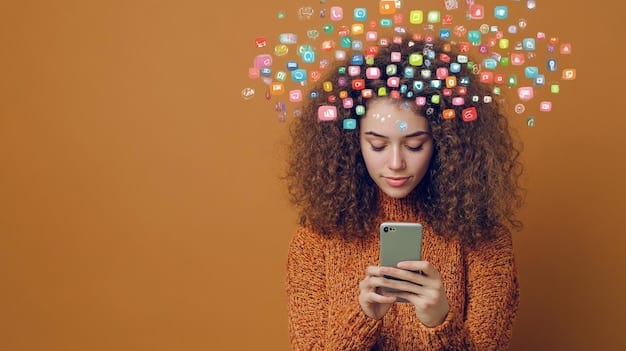Social Media & Focus: Regain Control and Beat Distractions

The impact of social media on focus is significant, as constant notifications and the allure of endless content can severely diminish concentration and productivity; however, strategies like time-blocking, mindful usage, and digital detoxes can help reclaim your focus and break free from these digital distractions.
In today’s hyper-connected world, understanding the impact of social media on focus: How to break free from digital distractions is more critical than ever. The constant barrage of notifications, updates, and content can scatter our attention, hindering productivity and diminishing our ability to concentrate on essential tasks. By recognizing these challenges and implementing proven strategies, we can reclaim our focus and navigate the digital landscape more mindfully.
Understanding the Allure and Impact of Social Media
Social media has become an integral part of our daily lives, offering connection, entertainment, and information. However, its design is inherently addictive, leveraging psychological principles to keep us hooked. Recognizing the allure and understanding the impact can be the first step towards regaining control of our focus.
The Psychology Behind Social Media Addiction
Social media platforms are engineered to be captivating. They employ variable rewards, providing unpredictable bursts of pleasure that keep users scrolling. These platforms also tap into our inherent need for social validation, reinforcing our engagement whenever we receive likes, comments, or shares.
The Multifaceted Impact on Cognitive Function
The impact of social media on our cognitive function is far-reaching. Frequent interruptions and multitasking can impair our attention spans, reduce our ability to think critically, and even affect our memory. Moreover, the blue light emitted from screens can disrupt our sleep patterns, leading to further cognitive decline.

To better illustrate the cognitive dangers, consider these points:
- Constant notifications interrupt deep work and critical thinking.
- Multitasking reduces efficiency and increases errors.
- Blue light exposure disrupts sleep cycles, affecting cognitive performance.
Understanding the profound impact of social media on our cognitive abilities is crucial for taking proactive steps. By acknowledging these effects, we can work toward minimizing its negative consequences and fostering healthier digital habits.
Identifying Your Social Media Consumption Patterns
Becoming aware of your social media consumption patterns is crucial in mitigating its impact. Understanding how, when, and why you engage with these platforms can reveal habits that undermine your focus. Self-awareness is the first step towards making positive changes.
Tracking Your Time Usage
Utilizing apps and features that track the amount of time spent on social media can be eye-opening. Both Android and iOS devices provide built-in tools to monitor screen time, breaking down usage by app. This data can help you identify which platforms are the biggest time-consumers.
Recognizing Trigger Points
Certain situations or emotions may trigger excessive social media use. Identifying these triggers – whether boredom, stress, or FOMO (Fear of Missing Out) – is essential. Once recognized, you can develop alternative strategies to manage these feelings without resorting to digital distractions.
Consider developing strategies to address these patterns:
- Implement app timers to restrict time spent on specific platforms.
- Identify emotional triggers that lead to excessive social media use.
- Create a log to track social media usage and associated feelings.
By diligently tracking your consumption patterns and being mindful of your triggers, you can begin taking control of your relationship with social media, paving the way for improved focus and productivity.
Setting Boundaries: Time-Blocking and Dedicated Focus Periods
Establishing clear boundaries is a powerful way to regain focus amidst the digital clamor. By setting specific time blocks and dedicated focus periods, you can create structured opportunities for deep work and reduce the temptation of social media distractions.
Strategic Time-Blocking Techniques
Time-blocking involves scheduling specific activities in your day, allocating dedicated time for focused work. During these blocks, eliminate distractions by turning off notifications and putting your phone out of sight. This structured approach helps to train your mind to concentrate on one task at a time.
Creating Dedicated Focus Periods
Dedicated focus periods are similar to time-blocking but often involve setting aside larger chunks of time for more involved tasks. These periods can be particularly effective when aligned with your natural energy levels, allowing you to tackle demanding projects when you’re at your peak.
To implement these strategies effectively, consider the following:
- Schedule focused work during your most productive hours.
- Use the Pomodoro Technique (25 minutes of focus followed by a 5-minute break) to maintain concentration.
- Create a distraction-free environment by turning off notifications and using website blockers.
By strategically implementing time-blocking and dedicated focus periods, you can create a structured environment that encourages concentration, mitigates distractions, and helps you reclaim your focus in a world of constant digital stimuli.
Mindful Social Media Usage: Quality Over Quantity
Adopting a mindful approach to social media usage is crucial for maintaining focus. Instead of mindlessly scrolling, intentionally curate your experience, choosing quality interactions over endless quantity. Conscious engagement can transform social media from a distraction to a valuable tool.
Curating Your Feed for Enhanced Focus
Unfollowing accounts that trigger negative emotions or promote mindless consumption can drastically improve your social media experience. Instead, follow accounts that offer value, inspiration, or educational content. A curated feed supports your focus and mental well-being.
Engaging Intentionally: A Conscious Approach
Before opening a social media app, ask yourself why. Are you seeking information, connection, or entertainment? Engaging with intention helps to prevent aimless scrolling and ensures that your usage aligns with your goals. This mindful approach reduces the likelihood of getting lost in the digital abyss.

Here are practical steps to foster mindful engagement:
- Unfollow accounts that trigger negative emotions or promote mindless consumption.
- Set specific intentions before engaging with social media.
- Limit the number of platforms you actively use.
By prioritizing quality over quantity and consciously engaging with social media, you can significantly reduce its distracting effects. This approach enables you to harness the benefits of social media while safeguarding your focus and productivity.
Digital Detox: Unplugging to Recharge and Refocus
Regular digital detoxes are essential for resetting your focus and rejuvenating your cognitive abilities. Taking intentional breaks from digital devices can help diminish your reliance on social media and promote a healthier, more balanced lifestyle. Unplugging allows you to recharge and reconnect with the physical world.
Planning Your Digital Detox
A digital detox can range from a few hours to several days, depending on your needs and lifestyle. Planning ahead is crucial for success. Consider choosing a weekend or vacation to disconnect entirely, and inform your friends and family of your intentions to minimize interruptions.
Engaging in Offline Activities
Fill your time with activities that don’t involve screens. This could include reading a book, spending time in nature, exercising, or pursuing a hobby. These offline activities help you disconnect from the digital world and rediscover the simple pleasures of life, further enhancing your focus.
To make your digital detox effective, consider these practices:
- Set clear boundaries for your detox period, informing others of your unavailability.
- Engage in activities that don’t involve screens.
- Reflect on your feelings and experiences during the detox.
By incorporating regular digital detoxes into your routine, you can reduce your dependence on social media, enhance your focus, and promote overall well-being. This intentional disconnection allows you to return to your digital life with renewed energy and clarity.
Creating a Supportive Environment for Focus
Cultivating an environment that supports focus requires intentional design and consistent effort. By minimizing distractions and optimizing your surroundings, you can create a space conducive to deep work and productivity. A supportive environment reduces the temptation to turn to social media.
Optimizing Your Physical Workspace
A cluttered or disorganized workspace can be a significant source of distraction. Clear your desk of unnecessary items, ensure proper lighting, and create a setup that promotes comfort and concentration. A tidy workspace fosters a clear mind.
Leveraging Technology for Focus Enhancement
While technology can be a source of distraction, it can also be a tool for enhancing focus. Utilize apps and browser extensions that block distracting websites, filter notifications, and promote deep work. These tools can help you create a digital environment that supports concentration.
Consider these steps to optimize your environment for focus:
- Declutter and organize your physical workspace.
- Use website blockers and distraction-filtering apps.
- Create a designated workspace free from interruptions.
By intentionally designing and consistently maintaining a supportive environment, you can minimize distractions and enhance your capacity for focus. This proactive approach helps reduce the lure of social media and enables you to achieve your goals with greater efficiency.
| Key Point | Brief Description |
|---|---|
| 📱 Track Usage | Monitor time spent on social media to identify consumption patterns. |
| ⏰ Time-Blocking | Allocate specific time slots for focused work to minimize distractions. |
| 🧘 Mindful Usage | Engage intentionally with curated content to improve social media experience. |
| 🌴 Digital Detox | Take intentional breaks from digital devices to reset focus and recharge. |
Frequently Asked Questions
▼
Social media’s design, with its variable rewards and endless content, triggers dopamine release, making it addictive. Constant notifications interrupt focus, impair cognitive function, and reduce attention spans.
▼
Effective strategies include time-blocking, scheduling specific activities, and using the Pomodoro Technique to maintain concentration. Creating a distraction-free environment also helps in setting boundaries.
▼
Mindful usage involves curating your feed, engaging intentionally, and setting intentions before opening social media apps. Limiting the number of platforms you actively use is also crucial.
▼
During a digital detox, engage in activities like reading books, spending time in nature, exercising, or pursuing hobbies. These offline activities help disconnect from the digital world.
▼
Create a supportive environment by optimizing your physical workspace, leveraging technology for focus enhancement, and designing a distraction-free space. This reduces the temptation to turn to social media.
Conclusion
Ultimately, mastering the impact of social media on focus requires a multifaceted approach, integrating self-awareness, strategic boundaries, mindful engagement, and environmental optimization. By implementing these strategies, you can reclaim your attention, enhance your productivity, and cultivate a more balanced and fulfilling digital life.





